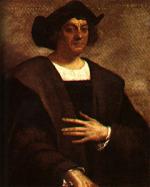|
This section contains 2,651 words (approx. 9 pages at 300 words per page) |

|
Overview
In A.D. 1000, Viking Norsemen commanded by Leif Eriksson (fl. eleventh century) landed on the shores of Newfoundland and established temporary settlements there. Four hundred years would pass before another generation of explorers, equipped with the navigational and technological innovations of the Renaissance, rediscovered the New World. Christopher Columbus (1451-1506), an Italian-born Spanish explorer, is popularly held to be the first European to cross the Atlantic Ocean and make landfall in the Americas. Historical myth asserts that Columbus discovered the New World inadvertently while attempting to find a more expedient and safe sea passage to the trading ports of Asia and that the greatest fruit of his voyage was disproving the theory that Earth is flat. Neither...
|
This section contains 2,651 words (approx. 9 pages at 300 words per page) |

|


